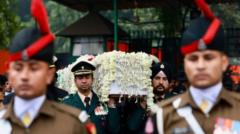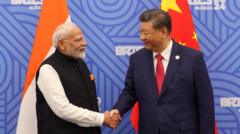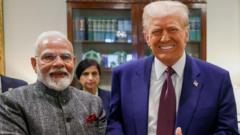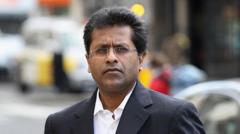The recent passing of Manmohan Singh, who served as India's Prime Minister from 2004 to 2014, has initiated a wave of tributes and mourning across the nation. The former leader, recognized as the architect of India’s economic liberalization, passed away at the age of 92. This weekend, his funeral was attended by high-ranking officials, foreign dignitaries, and countless mourners who lined the streets of Delhi to pay their respects.
Manmohan Singh: India Bids Farewell to Former Prime Minister with State Funeral

Manmohan Singh: India Bids Farewell to Former Prime Minister with State Funeral
India honors its former Prime Minister Manmohan Singh with a full state funeral amidst national mourning and global tributes.
Singh's impact on India's economy is substantial, having played a pivotal role especially during his tenure as finance minister in 1991. He was celebrated not just for his economic policies that contributed to significant poverty alleviation and growth, but also for his character marked by humility and kindness. Prime Minister Narendra Modi praised Singh as one of the country’s "most distinguished leaders," reflecting a consensus that transcends political divides.
During the funeral, Singh's coffin was escorted by an honor guard through the streets and flanked by leaders such as President Droupadi Murmu and Vice-President Jagdeep Dhankhar. His daughter lit his funeral pyre, while the ceremony featured a 21-gun salute, symbolizing the respect accorded to him. This state funeral followed a declaration of seven days of national mourning after his death.
Internationally, tributes highlighted Singh's significant contributions to India’s global standing. U.S. President Joe Biden credited Singh’s "strategic vision and political courage" for fostering unprecedented cooperation between the two nations.
Though Singh achieved substantial milestones in governance, his legacy is complex. His second term was marred by corruption allegations that ultimately led to his party's loss in the 2014 general elections. Nevertheless, he remains an influential figure, being the first Sikh to serve as Prime Minister and the first Indian leader after Jawaharlal Nehru to be re-elected post a complete term. His legacy as a transformative leader in India's history is firmly cemented.
During the funeral, Singh's coffin was escorted by an honor guard through the streets and flanked by leaders such as President Droupadi Murmu and Vice-President Jagdeep Dhankhar. His daughter lit his funeral pyre, while the ceremony featured a 21-gun salute, symbolizing the respect accorded to him. This state funeral followed a declaration of seven days of national mourning after his death.
Internationally, tributes highlighted Singh's significant contributions to India’s global standing. U.S. President Joe Biden credited Singh’s "strategic vision and political courage" for fostering unprecedented cooperation between the two nations.
Though Singh achieved substantial milestones in governance, his legacy is complex. His second term was marred by corruption allegations that ultimately led to his party's loss in the 2014 general elections. Nevertheless, he remains an influential figure, being the first Sikh to serve as Prime Minister and the first Indian leader after Jawaharlal Nehru to be re-elected post a complete term. His legacy as a transformative leader in India's history is firmly cemented.






















